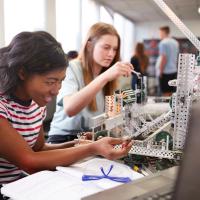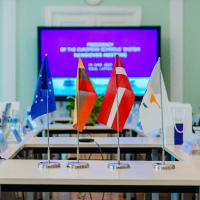Focus On: Should immigrants be taught in their mother tongue at schools?

Should immigrants be taught in their mother tongue at schools?
My mother tongue, Mende, is very expressive, very figurative, and when I write, I always struggle to find the English equivalent of things that I really want to say in Mende. For example, in Mende, you wouldn't say 'night came suddenly'; you would say 'the sky rolled over and changed its sides' – Ishmael Beah
Approaches to integration of migrants, refugees and asylum seekers in schools vary widely in Europe. In particular, the teaching language to be used with newly-arrived migrant pupils can be a controversial topic. Should they learn only the host country language or should they be encouraged to keep their mother tongue? The answer to these questions largely depends on how governments, society and schools understand the concept of integration.
The Eurydice report Integrating Students from Migrant Backgrounds into Schools in Europe: National Policies and Measures shows that a monolingual paradigm prevails in most publically funded schools, with education systems teaching through one common language, and promoting this linguistic model.
"I think there are different reasons that may explain this paradigm. The first is the notion one nation, one language, which is an old idea" affirms Dr. Ellen-Rose Kambel, Executive Director of Rutu Foundation. "Moreover, there is a general lack of awareness and information about the damage that could be done to children when their mother tongue is not valued, and also a lack of information on what teachers can do to develop a multilingual approach".
However, the dominant monolingual paradigm is increasingly being challenged, as societies become more linguistically and culturally diverse. In order to find effective learning strategies for multilingual classrooms, Dr. Emmanualle LePichon (University Utrecht) and Dr. Ellen-Rose Kambel (Rutu Foundation) created a pilot programme around the concept of translanguaging. Translanguaging involves pupils using multiple languages in a classroom without the teacher requiring special linguistic knowledge. Typically discussions may take place between small groups of pupils in their home language, and with the whole class group in the host country language. According to the Little Sponges project, which also uses this method, teachers could label objects in the classroom in multiple languages, give multilingual students their time to shine, and encourage them in using their mother tongue by allowing students with the same native language to work together.
Allowing children to communicate in their home languages in school strengthens their cognitive and social skills. Not only does this improve pupils' skills in the school language, but research shows that they are likely to have better critical thinking and problem solving skills, and have greater cultural awareness. The translanguaging method can be applied to both newly arrived and second generation children.
While not going as far as translanguaging, some countries still give space to mother tongue teaching for migrant children. In Belgium, for example, when migrant children do not speak the language of teaching they are supported through a linguistic adaptation process. In Brussels, Nadia Echadi, coordinator of École Maximilien and French teacher to migrant children, developed a method called Ergonomique. The method is structured in four steps: when children speak no French, they follow full time adaptation classes, where non-verbal language is used. In this first phase, they will join the rest of the class only for games and creative activities. Ideally, some other kids from the class play the role of mentors. Once migrant kids get some basic knowledge of French they participate half time in traditional classes. Eventually, children reach the stage where they can integrate full time in their class. There is no timeline for this adaptation process as every child has different needs and goes through the steps at her or his own pace.
Critics to the use of mother tongue for teaching may argue that these approaches represent a waste of public money, time and resources. This argument led to a change of the policy followed in Denmark between 1974 to 2002, when immigrant parents could enrol their children in supplementary language classes in their native language in school. The idea was that a better command of the native language could help the child succeed in Danish society. In 2002, however, politicians decided to spend the money on teaching immigrant children in Danish – thus joining the mainstream policy approach adopted in Europe.
Nevertheless, this is an instance where mainstream policy is in contradiction with research evidence. Indeed research shows that training in mother tongue strengthens the linguistic and academic development of the bilingual child as well as the development of a secure identity. The role of families and education of parents is also vital: parents who speak the instruction language fluently are able to help their children far more effectively than parents with a limited knowledge of the language.
Last but not least, the policy of ignoring mother tongue teaching for migrant children is not only in contradiction with research evidence but also with UNESCO's globally agreed Sustainable Development Goals (SDG). The respect of children's cultural identity is set within the international policy framework and according to UNESCO, "equitable quality education and lifelong learning for all is only possible when education responds to and reflects the multilingual nature of the society. Children, adolescents and adults require learning opportunities that are relevant to their lives and needs, in and through their own languages. Since SDG 4 is so foundational to the other Sustainable Development Goals, without mother tongue-based multilingual education the other 16 goals will remain unachievable" (UNESCO 2017).
Author: Anna Maria Volpe and David Crosier




